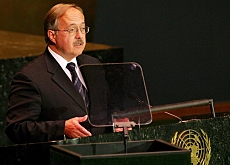Swiss urge UN to make human rights a priority

Switzerland has told a United Nations summit that the creation of a new Human Rights Council must be a priority and that it should be based in Geneva.
Addressing world leaders in New York, Swiss President Samuel Schmid also insisted that the UN Security Council should become more representative and its working methods reformed.
In his speech on Thursday, Schmid covered a wide range of themes from human rights and respect for international humanitarian law through to UN reform and the need to enhance development.
The president told the world summit that Switzerland was satisfied with progress towards setting up a Human Rights Council – which stems from a Swiss proposal – and was determined to pursue efforts in order to achieve it.
Key decisions on the council’s mandate, size and work have been deferred to the 60th General Assembly.
“By establishing this council, we should succeed in adapting the UN’s architecture in order to make human rights as much a priority as development, peace and security,” said Schmid.
“In Switzerland’s view, this new body will have to be both more legitimate and more efficient, hold a higher place in the United Nations’ hierarchy than the current Human Rights Commission, and should hold its sessions in Geneva.”
UN reform
Schmid said further reform of the world body was needed in order to bring “more effectiveness, more transparency and more solidarity”, and enable the UN to rise to today’s challenges.
“We also feel that it is necessary that the Security Council become more representative and that its working methods be reformed with a view to increased transparency, in order to allow improved interaction with non-members,” he said.
Nations are sharply divided over proposals to enlarge the Security Council from the current 15 members – five permanent members (China, France, Russia, Britain and the United States) and ten non-permanent members.
Schmid twice referred in his speech to the need to respect international law – both in the context of resolving conflicts and in the fight against terrorism. Switzerland is the depositary state of the Geneva Conventions.
He said the use of force should remain the exception in settling disputes and welcomed the creation of a UN Peacebuilding Commission.
He also reaffirmed Swiss support for peacekeeping operations as well as the fight against terrorism and the proliferation of weapons of mass destruction, particularly nuclear weapons.
UN Secretary-General Kofi Annan was highly critical on Wednesday of the failure by member countries to reach an agreement on how to tackle nuclear non-proliferation and disarmament.
Development aid
On the issue of development, Schmid said increased and coordinated efforts from all partners were needed if the Millennium Development Goals (MDGs) were to be attained.
The MDGs include targets to cut extreme poverty and child mortality by half and to reverse the spread of HIV/Aids by 2015.
Ahead of the summit, the Swiss government came under fire from non-governmental organisations for refusing to match the UN target of earmarking 0.7 per cent of gross domestic product (GDP) for official development aid by 2015. Switzerland currently designates 0.41 per cent of GDP.
Schmid told the summit that Switzerland planned to increase development aid by 8.0 per cent over the period 2005-2008. He added that the government would consider increasing its aid commitment beyond 2008.
“For nearly 30 years Switzerland has made a priority of giving aid to the poorest countries,” he said. “Today we devote nearly half of that aid to Africa, and we will resolutely stay the course in the future.”
swissinfo, Adam Beaumont in New York
The UN is expected to adopt a summit declaration on Friday, mapping out a number of initiatives including the establishment of a new human-rights body, a peacebuilding commission and an obligation to protect civilians against genocide, war crimes and ethnic cleansing.
But the declaration, which was agreed at the eleventh hour after months of wrangling, fails to agree a common approach to the spread of weapons of mass destruction or a new definition of terrorism, and falls short of developing nations’ hopes on trade and aid.

In compliance with the JTI standards
More: SWI swissinfo.ch certified by the Journalism Trust Initiative










You can find an overview of ongoing debates with our journalists here . Please join us!
If you want to start a conversation about a topic raised in this article or want to report factual errors, email us at english@swissinfo.ch.